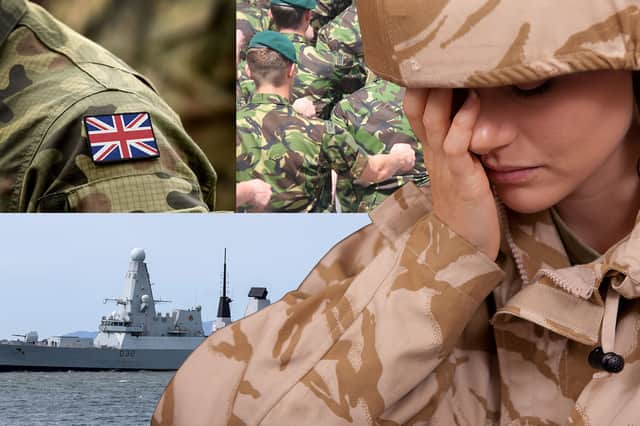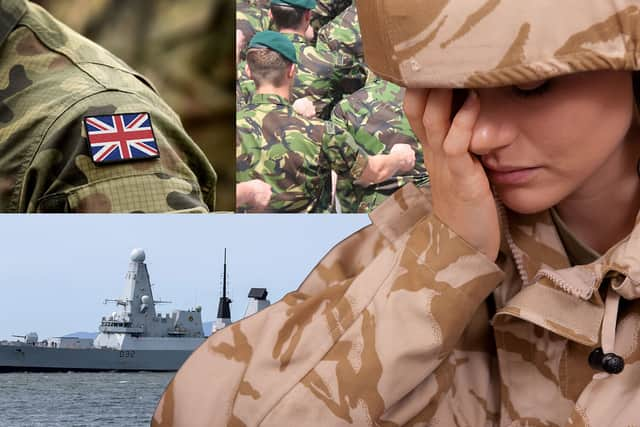Armed forces: calls for civilian police to look at military sex cases as women ‘terrified’ to report assaults


Women in the armed forces are “terrified” of reporting sexual assault experienced in the military and are “punished” for speaking out, a charity CEO has said. The Ministry of Defence recently announced a new unit has been launched to investigate serious crime, including rape and sexual assault within the armed forces, it will cover all three branches of the forces and replaces the existing Special Investigation Branches.
However, there have been repeated calls for the investigation and prosecution of sex offences to be dealt with by civilian police and courts rather than by the service police and court martial. Paula Edwards CEO of Salute Her UK, which works with women who have served in the armed forces and have experienced trauma, said this move was needed in order for women who have been the victim of sexual assault in the military to get the support they need.
Advertisement
Hide AdAdvertisement
Hide AdIt comes amid a host of allegations of sexual assault and harassment in the armed forces, and Admiral Sir Ben Key, the First Sea Lord and Chief of the Naval Staff, previously ordered an investigation into allegations of inappropriate behaviour in the submarine service, saying the allegations were “abhorrent” and sexual assault and harassment has “no place” in the Royal Navy. His comments followed a report in the Daily Mail that submariners had compiled a “crush depth rape list” that ranked women in the order in which they should be raped in a catastrophic event.
In 2019, a review into inappropriate behaviour in the armed forces by Air Chief Marshal Michael Wigston found that there were unacceptable levels of sexism, racism and bullying in the forces.
Last year, the experiences of servicewomen were laid out in a landmark report, the Defence Sub-Committee on Women in the Armed Forces received an almost unprecedented level of engagement during its inquiry, chaired by MP Sarah Atherton. Nearly 40% of 993 women asked reported that their experience of the complaints system was “extremely poor”. Six out of 10 women said they had not reported bullying, harassment or discrimination due to a lack of faith in the system.
The MoD announced a number of reforms to address the issues highlighted in the Women in the Armed Forces report. It said the chain of command would be entirely removed from complaints of a sexual nature, after a large number of women questioned said their experiences of the system were “extremely poor”. However, the department said it did not accept a recommendation to move cases of rape and sexual assault from military courts to the civilian system.
Advertisement
Hide AdAdvertisement
Hide AdAs the 16 days of awareness against gender-based violence draws to a close on 10 December NationalWorld spoke to Paula Edwards, and solicitors who represent women who have suffered sexual assault while in the armed forces, about barriers faced when reporting such incidents, and what needs to be done.
‘Women don’t really stand a chance in the fight and against the system’
Paula told of the barriers women face in reporting sexual assault while serving in the military. In 2017 she joined Forward Assist, a charity which supports those who have served in the armed forces, and was asked to set up a service for female veterans. She went on to carry out research about their experiences, interviewing 150 women from the army, navy and RAF. The findings were published in a report called No Man’s Land report in 2019, a follow-up No Man’s Land 2 was published last month.
Speaking about the challenges service women can face in reporting sexual assaults, Paula said: “A woman coming forward to report a sexual assault is often punished for being the victim and coming forward and speaking out, and that still stands today. So it’s really, really corrupt by design almost, the women don’t really stand a chance in the fight and against the system. Multiple systems often so it’s really difficult.”


Paula said that for the women who end up getting medically discharged, many “thrive” after being sent back to the civilian world, saying: “They do remarkably well, because they are away from the threat that followed them in the military. They’re away from the threat, they can process the trauma and work through it, and they can do amazing things.”
Advertisement
Hide AdAdvertisement
Hide AdShe added that “women’s voices get lost”, saying: “I think that not many people want to hear about what the women actually go through.” And she spoke of horrific incidents such as women having their sexual assaults recorded and put on PornHub, while others have had consensual sexual encounters recorded with hidden cameras.
Paula described it as “absolutely animalistic and appalling.” And she went on to say: “So it’s really difficult for women who do report, it’s absolutely terrible, they are absolutely terrified. Scared to death.”
“Scared to report in the first place because a lot of careers have been ended when a woman has reported a sexual assault, so a lot of them are frightened of speaking out because of the consequences, they are scared of the retaliation, they are just scared of losing their career.”
“A lot of the women actually say reporting their sexual assault is actually worse then the sexual assault.”
Advertisement
Hide AdAdvertisement
Hide AdAs part of the research for the No Man’s Land 2 report, participants were asked about the mental health consequences after experiencing the service complaints system or reporting serious crime to the military police.
One woman said: “Not feeling safe is a feeling I have carried since I was raped, blamed for it happening and then medically discharged. It’s a sensation that has followed me ever since.”
While another participant who took part in the research said: “The problem has been identified, how clear can it be when 6 out of 10 serving women have experienced sexual harassment, bullying & discrimination? Yet, the most important lifechanging decision was voted against. Sexual crimes need to go to civilian organisations.”
‘The military can’t do that and that’s where the problem lies’
Speaking about the new investigative unit, the Defence Serious Crime Unit, which has been described by military chiefs as being “completely independent of the chain of command”, Paula said it was a “positive step forward”, but added “it’s not want the women want, they feel like it’s still within the military, so it’s still a system that is skewed almost in favour of the military rather than the victim.” She went on to say: “The women have no trust whatsoever in the system.”
Advertisement
Hide AdAdvertisement
Hide Ad“The same thing keeps coming up, sexual assault cases need to be referred to the civilian police for investigation and they need to be handled through the civilian judicial system.”
She added: “In the civilian world, it’s easy to find out what you do if you’ve been raped. We just put it into Google, and it will tell you exactly what you need to do, when you need to do it where you need to go. There’s hundreds of phone numbers to ring, and you have a team of people going to make sure that you are okay, and that you are psychologically and physically safe. The military can’t do that and that’s where the problem lies.”
Meanwhile, Alan Collins head of the abuse team at Hugh James Solicitors said: “Sexual assault and harassment cases in the armed forces are not uncommon. What we see often is blurring of boundaries and culture that enables this. We have seen some very high-profile cases in the Royal Navy over recent years: sexual abuse of naval cadets, inappropriate behaviour in accommodation and sexual harassment of female sailors on-board ships .
“Banter perceived by some as good nature and camaraderie too easily creates an environment where all are expected to join-in to be “one of the boys”, or to not be “the odd one out”.
Advertisement
Hide AdAdvertisement
Hide Ad

According to MoD figures between 1 January 2021 and 31 December 2021, the court martial system heard a total of 145 sexual offence charges - which included charges relating to non-recent sexual offences against 96 defendants. The outcome of these trials was that 36 service personnel and civilians subject to service discipline were found guilty of 59 charges
Simon Ellis, head of the military team at Hugh James says improving the conviction rate “following unacceptable conduct would send a clear message”, Mr Ellis of Hugh James said the firm is regularly approached by those subjected to the type of behaviour the Royal Navy has been trying to address.
He said: “Unless and until the MoD gets to grips with this issue, many in our armed forces will continue to suffer totally unacceptable treatment. It would be grossly unfair to suggest everyone within the armed forces is sexist. The majority of service personnel regard such attitudes as unacceptable. The difficulty has always been rooting out those elements within the military who persist with such attitudes.
“The stories of the women who approach me seeking help are nothing short of horrific. I am still shocked at the behaviour that continues to persist in some parts of the armed forces.”
Advertisement
Hide AdAdvertisement
Hide AdWhat measures has the MoD taken?
The MoD says measures taken include the launch of the Defence Strategy on Tackling Sexual Offending earlier this year. Work is also being done to develop new measures to ensure commanding officers who, when found by the Service Complaints Ombudsman to have fallen short of expected standards in handling service complaints, receive appropriate, consistent and robust consequences, that appear on their employment records. Work is also being done to ensure female representation on court martial boards including cases related to sexual offending.
As well as launching the Defence Serious Crime Unit, the MoD says it has been working to improve reporting mechanisms so personnel feel safe in raising issues and confident allegations will be acted on. It also pointed complaints of bullying, harassment or discrimination now being dealt with by someone outside an individual’s chain of command, as well as the introduction of zero tolerance policies to strengthen the levers available to dismiss or discharge anyone who has committed a sexual offence or other unacceptable behaviour.
The MoD pointed to Home Office Police Forces referring 5.6% of all adult rape reports to the Crown Prosecution Service last year, while Service Police referred 49% of rapes to the Service Prosecuting Authority, and said a case in the Service Justice System is more likely to proceed to trial.
An MoD spokesperson said: “These offences have no place in the Armed Forces and any allegation that is reported will be investigated, with appropriate action being taken.
Advertisement
Hide AdAdvertisement
Hide Ad“We recently launched an independent Serious Crime Unit to investigate crimes anywhere in the world across our services and our new zero tolerance policies will also ensure that anyone convicted of a sexual offence will be dismissed from service.
“We will continue to improve reporting mechanisms so personnel feel safe in raising issues and allegations are dealt with by someone outside an individual’s chain of command.”
- The 24/7 Rape Crisis helpline can be contacted on 0808 500 222
Comment Guidelines
National World encourages reader discussion on our stories. User feedback, insights and back-and-forth exchanges add a rich layer of context to reporting. Please review our Community Guidelines before commenting.
